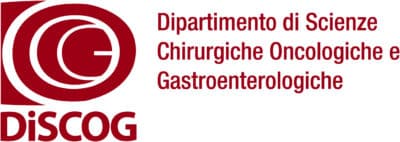
The Second-level Short Specialisation Degree in Hereditary Cancer: from Molecular Profile to Management, prepares specialists with multidisciplinary competencies from dedicated diagnostic-therapeutic paths on hereditary neoplastic syndromes – areas of growing interest for molecular oncology progresses and for recognizing oncological prevention as an essential care level.
The course focuses on the acquisition of cross-sectional multidisciplinary knowledge of molecular biology, pathological anatomy, medical genetics, oncology, gastroenterology, general surgery, senology, gynaecology, endocrinology and psychology, necessary and sufficient to create a cultural and professional profile capable of managing the patients and families suffering from the most frequent hereditary neoplastic syndromes.
The Second-level Short Specialisation Degree provides professionals with the skills to manage the oncological genetic prevention autonomously, in a spoke centre, and to work for a hub centre.
The course units of the Second-level Short Specialisation Degree in Hereditary Cancer: from Molecular Profile to Management provide advanced and thorough training on how to manage the hereditary genetic risk in oncology. The course is organized from general to specific, so that both professionals with a pre-clinical and clinical training can acquire suitable knowledge to manage the most frequent neoplastic syndromes, during the Master.
It starts with modules on molecular biology, medical genetics, pathological anatomy and general oncology, and ends with covering every single hereditary syndrome.
The Second-level Short Specialisation Degree in Hereditary Cancer: from Molecular Profile to Management is addressed to healthcare professionals dealing with patients subject to hereditary-familiar oncological risk. Since the course includes both general molecular knowledge and clinical management, both pre-clinical Master’s Degree graduates and doctors with a clinical specialization (oncology, gynaecology, medical genetics, etc.) may suitably take part in the Master. After completing the Master, professionals will be able to interact with the different professional figures that work together to manage a patient and a family with hereditary neoplastic syndrome, and become their care providers.
Professionals can find opportunities in genetic and pathological anatomy services that deal with the diagnosis and management of genetic cancer predisposition, in companies belonging to the molecular oncology diagnostic field, and in U.O. of oncology, gastroenterology, surgery and gynaecology dealing with hereditary neoplastic syndromes. Also, professionals can become the reference point for oncologic genetic risk management clinics, and coordinate the activities of the other professional figures involved in managing the patient and their families; if working for molecular oncologic diagnostic companies, they acquire the skills to understand and meet the needs during the pre-clinical and clinical phases of the therapeutic diagnostic process.
The Second-level Short Specialisation Degree in Hereditary Cancer: from Molecular Profile to Management provides training on:
ELEMENTS OF MOLECULAR BIOLOGY FOR HUMAN GENETICS
Fundamentals of molecular biology, basic hereditary notions and mechanisms behind human genetic diseases.
MOLECULAR BIOLOGY IN ONCOLOGICAL GENETICS
Germinal and tissue genetic testing, molecular data interpretative algorithms, classification, clinical use.
MOLECULAR ANALYSIS TECHNIQUES APPLIED TO ONCOLOGY
Types of analysis: indications, limits, future prospective. Bio-banks.
MEDICAL GENETICS IN HEREDITARY NEOPLASTIC SYNDROMES (HNS)
General genetic consultancy information; specific HNS aspects. Preconception and prenatal consultancy. New scenarios: universal screening, next generation sequencing.
MOLECULAR CANCER PATHOLOGY
Molecular cancer cell biology. Cancer mutations. Somatic oncological molecular analysis techniques.
GASTROINTESTINAL (GI) CANCER PATHOLOGICAL ANATOMY
General GI cancer pathological anatomy notions and specific HNS aspects.
PATHOLOGICAL ANATOMY OF GYNECOLOGYCAL
AND BREAST TUMORS
General gynaecological and breast cancer pathological anatomy notions and specific HNS aspects.
ENDOCRINE CANCER PATHOLOGICAL ANATOMY
General endocrine cancer pathological anatomy notions and specific HNS aspects.
GYNAECOLOGICAL AND BREAST CANCER ONCOLOGY
General gynaecological and breast cancer medical oncology notions and specific HNS aspects.
GASTROINTESTINAL CANCER ONCOLOGY
General GI cancer medical oncology notions and specific HNS aspects. Neuro-endocrine cancer.
CANCER ONCOLOGY AND ENDOCRINOLOGY
General oncological endocrinology and specific HNS aspects.
RADIOLOGICAL SENOLOGY
Senology imaging methods. Breast cancer screening and monitoring.
ABDOMINAL RADIOLOGY
Radiological imaging on the small intestine; for pre-cancerous pancreas damage; for the female reproductive system.
ONCOLOGICAL CLINICAL PSYCHOLOGY
Fundamentals. Clinical psychology assessment tools and interventions in patients with HNS and their families.
GASTROINTESTINAL HEREDITARY NEOPLASTIC SYNDROMES
Molecular aspects and management of Lynch syndromes, gastric and hereditary cancer, adenomatous, hamartomatous and serrated polyposis. Hereditary kidney cancer. Rare cancers in rare syndromes. Paediatric GI HNS manifestations. General and preventive surgery aspects.
FAMILIAL BREAST CARCINOMA AND BRCA SYNDROMES 1 and 2
Genetics, medical and surgical management of familiar and BRCA 1/2 mutation-related carcinoma.
FAMILIAL MELANOMA
Genetics and management of the familial melanoma syndrome.
BIOETHICHS, REGULATOR AND ORGANIZATIONAL ASPECTS IN THE MANAGEMENT OF SYNDROMIC HEREDITARY NEOPLASTIC SYNDROMES
Bioethics, regulatory and organizational aspects in the management of syndromic
hereditary neoplastic syndromes.
FAMILIAL AND HEREDITARY PANCREATIC CARCINOMA
Pre-cancerous pancreas damage; medicine and management of familial and hereditary pancreatic cancer.
The University of Padua has decided to activate a Second-level Short Specialisation Degree on Hereditary Cancer, since this topic registers an actual and lively medical and scientific interest. The University of Padua, the University Hospital of Padua and the Istituto Oncologico Veneto can count on a consolidated experience in managing hereditary cancer, which can be thoroughly handled in the Padua hub: from molecular biology to medical, endoscopic or surgical treatment, to nationally and internationally renowned professionals that teach at the Master’s Course. Attendees will find a faculty prepared from a scientific standpoint, and who also works with patients and families with hereditary neoplastic syndrome on a daily basis. There are also multidisciplinary groups for hereditary cancer management: some of them are already formalized and active (gruppo multidisciplinare per i tumori ereditari gastrointestinali – multidisciplinary group for hereditary gastrointestinal cancer, with their own online platform to present their cases, Colleghi di tutto il Veneto); others are being formalized (gruppo multidisciplinare mammella/ovaio – multidisciplinary breast/ovary group ), while others still have been active for years and their formalization is under way (melanoma familiare – familial melanoma, MEN).
Some situations have made the management of hereditary cancer a necessity, not just in the reference centres (hub), but also on the territory (spoke centres).
Just to mention a few:
- DPCM according to which neoplastic prevention is an essential care level [Official Journal no.33 of 08-02-2002-Ord. Suppl. no. 26]
- The possibility of identifying the Lynch syndrome in all new incident cases of colon and endometrium carcinoma, through a cost-effective and repeatable immunohistochemical test.
- The resolution by the Veneto Region transposing the document by the Gruppo dello Screening del tumore colorettale (Colorectal cancer screening group) for the diagnosis of 10+ synchronous polyps is an indication for genetic consultancy
- The genetic analysis technology on a multigene panel (NGS), which allows analysing a good number of gene on the same DNA sample at low cost
However, the figure of a care provider – a professional with such a broad training to manage the patient and their family’s path completely, by coordinating the specialists involved in it – is still missing. The Master aims at training such figure, with the consequent and plausible short-term professional outlets
The general ranking of merit for the academic year 2025/26 will be published on the Italian page of this Master according to the timing provided in the Call.
Information
FAQ
The Second-level Short Specialisation Degree will be organized in 38 days of lessons, 8 hours/day, usually one day a week. Lessons will be done remotely, while molecular and pathological anatomy workshops, and attendance to clinics, endoscopic and operating rooms, etc., will be done in person. Some workshops may be held online, if they concern the interaction with images (e.g. radiological images, surgery or endoscopy videos), and can be commented on either in-person or remotely, with the same results. There won’t be any in-person or remote lessons on the same day. Remote lessons will be held through Zoom or Google Meet, and the relevant link will be sent at least 7 days earlier.
Attendance will be taken by the professors through video display.
At least 70% of the hours are mandatory, without other specifications.
For instance, if an attendee is a molecular biologists, he can decide not to attend the lessons on molecular biology, up to 30% of the total course hours.
The final exam will be written, with multiple answers and short free answers. 2 hours will be allotted for its completion.
Assessment for access to the Second-level Short Specialisation Degree is done by the executing Committee, based on the applicant attendee’s resume.
A Master’s Degree among those listed in the call is required, and all genetic, oncological prevention, and care treatment related medical and scientific activities duly proven by the applicant will be positively evaluated.
No, unfortunately, there will be no scholarships and no forms of facilitations to attend the Master.

